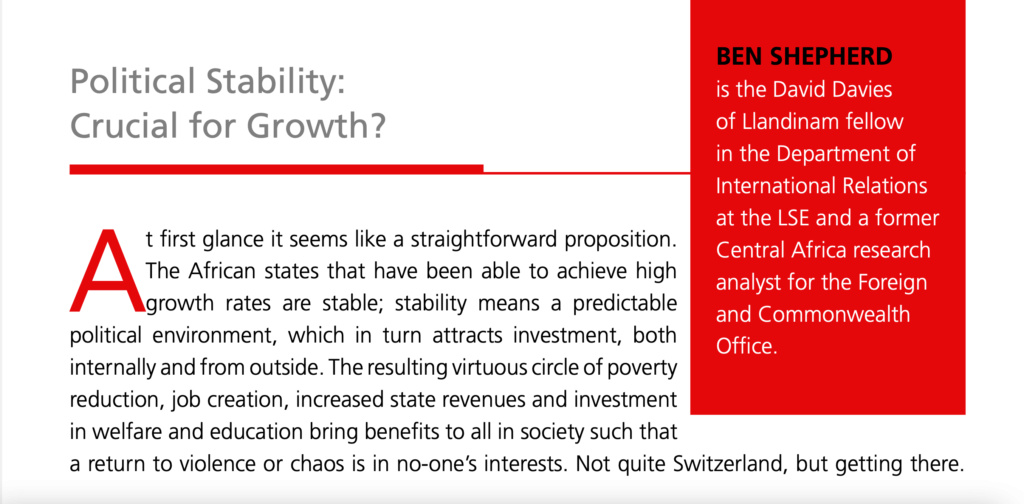http://wwww.lse.ac.uk/international-relations/assets/documents/dinam/Dinam.Shepherd.Ben.Political-Stability-Crucial-for-Growth.pdf
At first glance it seems like a straightforward proposition.The African states that have been able to achieve high growth rates are stable; stability means a predictable political environment, which in turn attracts investment, both internally and from outside. The resulting virtuous circle of poverty reduction, job creation, increased state revenues and investment in welfare and education bring benefits to all in society such that a return to violence or chaos is in no-one’s interests. Not quite Switzerland, but getting there.
But, as always, the devil is in the definitions. Specifically, what type of stability do we mean? It may seem a glib point, but there are a number of African states that do not normally make it on to the list of high-performers, that nonetheless have remarkably stable political systems. Military dictatorships are stable; Eritrea shows absolutely no signs of internal unrest yet is economically moribund, reliant on remittances and external assistance. The Gambia is tightly in the grip of President Jammeh, as it has been since 1994, and remains as impoverished as ever.
The list of long-standing Heads of State in Africa trips off the tongue: President Dos Santos of Angola has been in power since 1979, as has President Obiang of Equatorial Guinea, though interestingly each has had spectacular growth rates in recent years due to oil revenues. And change doesn’t necessarily arrive even when these political survivors depart the scene. Recent years have seen a series of family successions, with Bongo fils seamlessly taking the reins from Bongo pere in Gabon, likewise the transition from Gnassingbe to Gnassingbe in Togo.
More importantly, even when an old elite seems to have been excised, incoming leaders take on the mantle of the outgoing with a barely-disguised enthusiasm. The Democratic Republic of the Congo is a good example. The hope of Mobutu’s toppling in 1997 lasted barely months before Kabila’s aura slipped and the old patterns of Congolese politics reasserted themselves. The seminal work on Zairean systems of government was written in the 1980s, but change a few names and it could be describing the Congo of the present, despite the cataclysmic upheavals of more than 15 years of war. Though Nigeria’s byzantine politics seems to have lost the military involvement of the past, the pattern of personal enrichment, local patronage and national chaos remains the same.
Read More:
http://wwww.lse.ac.uk/international-relations/assets/documents/dinam/Dinam.Shepherd.Ben.Political-Stability-Crucial-for-Growth.pdf
 would enable you to enjoy an array of other services such as Member Rankings, User Groups, Own Posts & Profile, Exclusive Research, Live Chat Box etc..
would enable you to enjoy an array of other services such as Member Rankings, User Groups, Own Posts & Profile, Exclusive Research, Live Chat Box etc.. 
 Home
Home


















